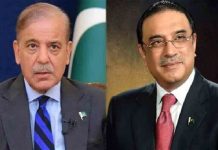-Resolutions says separate elections will impact outcome of general elections
-Claims simultaneous polls across the country to strengthen federation
-PM rejects PTI’s demand to stage snap polls in Punjab, KP
-In contrast, Finance Minister tables Bill seeking approval of funds for Punjab, KP polls on Supreme Court’s orders
-Supporting one time polls, Dar says simultaneous elections will reduce expenditures
By Anzal Amin
ISLAMABAD: The parliament’s joint sitting Monday adopted a resolution stressing the holding of general elections of the national and the provincial assemblies simultaneously to “strengthen the federation”.
Federal Minister for Parliamentary Affairs Murtaza Javed Abbasi and Senator Kamran Murtaza moved two identical resolutions aimed to promote political stability and foster unity among the provinces.
The resolutions argued that organising general elections of all the assemblies simultaneously. The resolutions emphasised the significance of appointing neutral caretaker set-ups to ensure impartiality and fairness during the elections.
The resolutions also argued that holding separate elections in Punjab, the largest federating unit with over 50% of the National Assembly seats, would inevitably impact the outcome of general elections to the National Assembly seats in Punjab.
Therefore, it could potentially marginalise the smaller provinces’ role in the federation, the resolutions noted.
Amid the session, Pakistan Tehreek-e-Insaf (PTI) senators staged a token walkout from the house to register their protest. “Hold elections and save the country,” the PTI senators chanted.
The development comes after a three-member bench of the Supreme Court unanimously declared the Election Commission of Pakistan’s (ECP) order to delay the election in Punjab and Khyber Pakhtunkhwa “unconstitutional”. The three-member bench — led by Chief Justice of Pakistan (CJP) Umar Ata Bandial and
comprising Justice Munib Akhtar, and Justice Ijaz Ul Ahsan — also ordered the electoral body to hold elections in the province on May 14 and asked the government to provide funds to the ECP for holding the polls.
The ECP postponed the date of the election in Punjab to October 8 — initially scheduled to take place on April 30 — citing a resurgence of terror attacks, a shortage of security personnel and an unprecedented economic crisis.
The coalition government has rejected the top court’s decision and has already tabled a bill in both houses of the parliament — National Assembly and Senate — pertaining to funds for general elections.
The PTI has slammed the government’s move and declared the decision to reject the apex court’s decision “baseless”, claiming that the parliament did not have the authority to dismiss a court order.
The two assemblies were dissolved in January on the orders of PTI Chairman Imran Khan as he demanded the government hold elections across the country. But PM Shehbaz Sharif has rejected the idea.
Amid strong protest from the PTI, the federal government also got the Supreme Court (Practice and Procedure) Bill, 2023, passed in the joint session of parliament after President Arif Alvi returned the bill seeking to curtail the chief justice’s suo motu powers last week.
Law Minister Law Minister Azam Nazeer Tarar presented the SC bill in the joint sitting of the house held with National Assembly Speaker Raja Pervaiz Ashraf in the chair.
The president had returned the bill for reconsideration to parliament as per the provisions of the Article 75 of the Constitution, stating that the bill prima-facie travels beyond the competence of parliament and can be assailed as colourable legislation. The bill was aimed at curtailing the powers of the chief justice of Pakistan (CJP) — including the suo motu and the formation of benches.
Addressing the joint session, the law minister said that voices against the chief justice’s suo motu powers were arising from within the top court.
The passed bill aims at giving the power of taking suo motu notice to a three-member committee comprising senior judges, including chief justice. It also aims to have transparent proceedings in the apex court and includes the right to appeal.
Regarding the constitution of benches, the bill states that every cause, matter or appeal before the apex court would be heard and disposed of by a bench constituted by a committee comprising the CJP and the two senior-most judges. It added that the decisions of the committee would be taken by a majority.
On the other hand, Federal Minister for Finance and Revenue Ishaq Dar Monday tabled a bill pertaining to funds for general elections in Punjab and Khyber Pakhtunkhwa hours before the deadline given by the Supreme Court for disbursal of Rs21 billion to the Election Commission of Pakistan (ECP) ends.
The bill titled “Charged Sums for General Elections of Provincial Assemblies of Punjab and Khyber Pakhtunkhwa Bill 2023” was presented in both houses of the parliament — National Assembly and Senate — minutes after the federal cabinet approved a summary prepared by the Ministry of Finance regarding the expenditure on elections.
The Supreme Court, in its April 4 verdict, had directed the federal government to release and provide ECP with funds worth Rs21 billion in any case by April 10 for polls.
While presenting the bill in the National Assembly, the finance minister said that it is now the responsibility of the parliament to decide whether funds to ECP should be released or not.
Expressing his views in the lower house, Dar said snap polls ordered by the apex court were not in the national interest due to security, and economic situation.
“Elections in all assemblies should be held on the same date,” the finance minister said, adding that the government laid this bill before the parliament in light of the Supreme Court’s orders to release Rs21 billion to the ECP.
The finance czar recalled that the lower house had also passed a resolution that the apex court’s order into the suo motu notice regarding holding elections in Punjab is a decision of 4-3 and the judgment of 3-0 is a minority verdict and that “should not be implemented”.
He further added that the federal cabinet, in its recent meeting, pondered over the apex court’s orders and in view of this NA’s resolution, has sought the will of the parliament to take a final decision regarding the allocation of funds for general elections for the provincial assemblies of Punjab and KP.
The finance minister said the coalition government fully believes in the supremacy of the parliament and rule of law and the Constitution.
Dar maintained that conducting elections is a constitutional responsibility, but it requires that polling for national and all the provincial assemblies is held simultaneously under caretaker setups.
He said this will not only reduce expenditures but also ensure free, fair, and transparent elections.
The finance czar recalled that the Pakistan Tehreek-e-Insaf (PTI) regime had brought the country to the verge of default by violating the sovereign commitments made with the International Monetary Fund (IMF), adding that this also harmed the credibility of Pakistan.
Pakistan is in danger of defaulting on its debt, with an IMF bailout programme stalled since November, while a bruising political battle is raging between the government and former prime minister Imran Khan.
The cash-strapped nation is in dire need of funds with its foreign exchange reserves hovering around $4.2 billion which provides barely one month of import cover.
NA Speaker Raja Pervez Ashraf referred the bill to the NA standing committee concerned while adjourning the session till Thursday (April 13) 2pm.
Following the development, the Pakistan Tehreek-e-Insaf (PTI) registered strong protests against the development, calling out the coalition government for their “ill practices”.
“A year after regime change conspiracy, puppet Crime Minister [and] his gang’s strings being pulled to formalise fascism using [parliament] to stop elections [and] end [independence] of the judiciary,” former human’s rights minister and senior PTI leader Shireen Mazari wrote on Twitter.
A day earlier, the cabinet had decided to refer the funds’ disbursal issue to the parliament, while also keeping in view the National Assembly’s resolution of April 6.
Through the resolution, the house asked the government not to implement the decision taken by the three-member bench, which ordered the ECP to hold the Punjab Assembly elections on May 14, terming the same unconstitutional and against the law.
Instead, the National Assembly, through the resolution, maintained the majority decision taken by four judges would be acceptable.
The federal cabinet Sunday had directed the finance minister — who has postponed his trip to the US on the premier’s directives — to prepare a summary for the release of elections funds for the guidance of the parliament.
During Sunday’s meeting, Law Minister Azam Nazeer Tarar briefed the cabinet on all the legal and constitutional aspects of the Supreme Court directives and the release of funds to the ECP.




